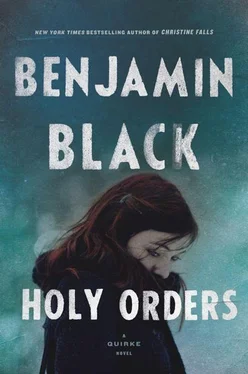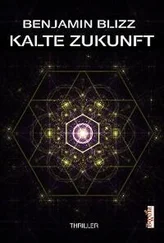“Byzantine general. They say the emperor Justinian had his eyes put out and left him to beg in the streets.”
“Why?”
“Too successful in the wars, a threat to the throne.”
“Typical.”
“Of what?”
“Men.”
“Who was the typical one, Belisarius or the emperor?” She gave him a scathing glance. “Anyway,” he said, “it’s only a legend.”
“Like all history.”
He smiled at her blankly, nodding. Something dangerous had come into the atmosphere, a sense of rancor. He did not want a fight.
“So,” she said, “tell me what’s been happening. It feels as if I’ve been away forever.”
He saw again fleetingly, but with startling clearness, that image of the canal bank, the soft darkness over the water, the leaning, stealthy trees. “Jimmy Minor was killed,” he said.
Still perched on the chair arm, with her shapely legs crossed, she had forgotten about the book and was examining idly the toe of one of her shoes. Now she frowned, and seemed to give herself a tiny shake. “What?”
Quirke added another drop of whiskey to the cold dregs of coffee in his cup and drank. The bitter taste made him wince. “Jimmy Minor,” he said. “You met him, didn’t you? Reporter on the—”
“I know who he was,” she said sharply, turning to look at him. “That friend of Phoebe’s. Killed, you say?”
“Murdered. Someone, or some ones, beat him to death. He was found in the canal below Leeson Street Bridge.”
She was gazing at him now in what seemed a kind of wonderment. “When?”
“Couple of days ago.”
“My God,” she said tonelessly. She rose and walked to the fireplace and put one hand on the mantelpiece and stood there, facing the mirror, her eyes hooded. She was silent for a time, then spoke in an oddly faraway voice. “Don’t you ever feel anything?”
He looked at the pale back of her neck. “How do you mean?”
“You just — you just announce these things, as if…” She stopped. She was shaking her head. Now she turned. She was pale, and her mouth quivered. “Don’t you even care?”
“About what? About Jimmy Minor being killed? Of course I care—”
“You don’t !” she cried. “You couldn’t, and speak of it in that — that offhand way.”
He sighed. “I care,” he said, “of course I care. But what good does caring do? Caring is only another way of feeling sorry for yourself.”
She was looking at him with such intensity that her eyes seemed to have developed a slight cast. “What a monster you are, Quirke,” she said softly, almost in a murmur.
He turned away from her, suddenly furious. It was always the same, there was always someone telling him how awful he was, how cold, how cruel, when as far as he could see he was only being honest.
“What about Phoebe?” Isabel asked behind him. “Is she all right?”
“She’s fine. She was upset when she heard, but now she’s fine.” He wanted to say, She’s my daughter, isn’t she? And the Quirkes don’t care. But he was remembering Phoebe in the hotel that day, after he had told her, her ashen face, her trembling hands. Perhaps she was not fine; perhaps she was not fine at all. “You might ring her up,” he said.
He still had his back turned to her, afraid she would see the bloodshot anger in his eyes. But then, suddenly, in an instant, the anger drained away, and he just felt tired.
He returned to the mantelpiece and took another cigarette and lit it. Isabel had sat down again, in the armchair this time, and was staring into the pulsing grid of the gas fire. “Give me some more whiskey, will you?” she asked. “In a glass. I don’t suppose you have any gin?” She frowned distractedly. “I should buy a bottle, keep it here”—she gave a cold laugh—“for emergencies.”
He fetched a tumbler from the kitchen and poured a measure of whiskey and handed it to her, his fingers brushing hers; her skin felt cold and slightly moist. He had an urge to take her by the arm and drag her behind him into the bedroom and strip her of her clothes and lie down with her and clasp her against him, the chill, long length of her, and smell her hair and her perfumed throat, and put his lips to hers and forget, forget everything, if only for a few minutes. He wondered why he was so upset. Perhaps after all he did care about Jimmy Minor, perhaps he cared more than he knew or dared acknowledge. He was a mystery to himself, always had been, always would be.
“Tell me what happened,” she said.
He leaned an elbow on the mantelpiece. He realized that he was glad of the heat of the fire; he too must have been cold, without knowing even that. “A courting couple spotted the body,” he said. “It was naked, in the water—” It . He glanced at her, expecting her to pounce on the word and begin berating him again, but she said nothing. “He was beaten to death, as I say. Kicked, and so on. I hardly recognized him, when they brought him in.”
She lifted her head. “You did the postmortem?”
“There was no one else.”
“Doesn’t it”—her gaze drifted back to the fire—“doesn’t it trouble you, doing that to someone you know?”
“I couldn’t do my job if I let it trouble me.”
She gave her head a dismissive toss. “Yes yes, of course. You always say that, and I always forget you’re going to say it.”
He looked at a framed photograph beside his elbow. There were four people in the picture, and two of them, his wife and her sister, were dead. He had loved them both. “A corpse is a corpse,” he said, sounding harsher than he had intended. “There’s no one there anymore. Hard to care for flesh when the soul is gone.”
She laughed, a soft snort. “I thought you didn’t believe in the soul.”
“I don’t.”
“Then what is it that’s alive, what is it that goes when the body dies?”
“I’ve no idea.” He was tired .
She looked at him and smiled sadly. “You’ve lived too long among the dead, Quirke,” she said.
He nodded. “Yes, I suppose I have.” She was not the first one to have told him that, and she would not be the last.
* * *
He liked the coolness of her bare flank under his hand, when she lay on her side like this, turned away from him, lightly sleeping. The bed was not really wide enough to accommodate their two recumbent bodies. His right arm, trapped under her, had gone to sleep, but he left it there for fear of waking her. He had turned off the bedside lamp, and the moon was in a high-up corner of the window, a fat indifferent eye watching over the world. In his thoughts he was seeing yet again the dark canal, the silent towpath. What was out there in the night that he was longing for? Rest, quiet, escape. Death, maybe. But what kind of death? Isabel was right, he had seen too many corpses, had sectioned them out and delved into their innards, to entertain any illusions about what the priests used to call our final going forth. Dying, he was convinced, was no more than an ending.
No, what he yearned for in his deepest heart was not death, not the grand and terrible thing that priests and poets spoke of, but rather a state of nonexistence, of simply not being here. Yet that state was unthinkable, for in it there would be no being — it would not be him, inexistent, but not-him. It would not be a state at all. It would be nothing, and nothing is inconceivable. All his life, for as long as he could remember, he had wrestled with this conundrum. Was that why he had become a pathologist, in hope of penetrating nearer to the heart of the mystery? If so, it had been in vain. The dead did not give up their secrets, for they had none; they had nothing, were nothing, only a parcel of blood and bones, gone cold.
Читать дальше












